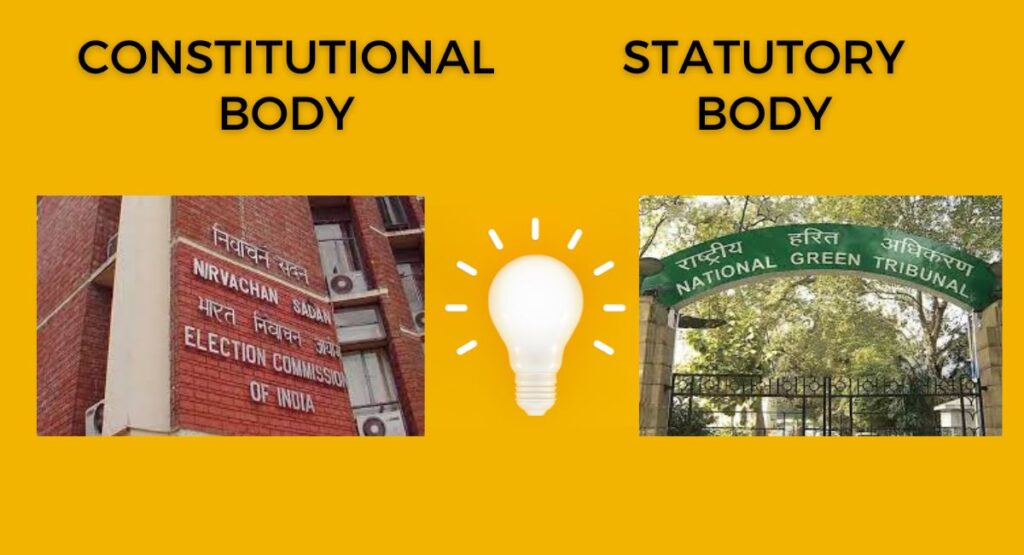A statutory body and a constitutional body are two different types of organizations that operate under different legal frameworks. Understanding the difference between these two types of bodies is important for understanding their roles and functions in society. In this article, we will explore the key differences between a statutory body and a constitutional body.

Table of Contents
Statutory Body
A statutory body is a legal entity that is created by an Act of Parliament or state legislature. It is established to carry out a specific function or set of functions, and its powers and functions are defined by the legislation that created it. A statutory body can be created to regulate, supervise, or manage a particular sector or industry, such as banking, insurance, or telecommunications.

Statutory bodies can be either independent or semi-independent. An independent statutory body is one that is fully autonomous and operates independently of the government. It is accountable to the Parliament or state legislature that created it. A semi-independent statutory body is one that operates under the supervision of a government department or ministry.
Examples of statutory bodies in India include the Reserve Bank of India (RBI), Securities and Exchange Board of India (SEBI), and the Telecom Regulatory Authority of India (TRAI).
Constitutional Body
A constitutional body is a body that is established by the Constitution of India. It is created to perform a specific function or set of functions that are essential to the functioning of the government. The powers and functions of a constitutional body are defined by the Constitution, and it operates independently of the government.
A constitutional body is generally more powerful than a statutory body, as it is created by the Constitution, which is the supreme law of the land. A constitutional body is also more difficult to amend or dissolve than a statutory body.
Examples of constitutional bodies in India include the Election Commission of India (ECI), the Union Public Service Commission (UPSC), Comptroller and Auditor General of India (CAG) etc.
Differences between Statutory Body and Constitutional Body
| Criteria | Statutory Body | Constitutional Body |
|---|---|---|
| Source of Creation | Created by an Act of Parliament or Legislature | Created by the Constitution of the Country |
| Powers | Given powers to regulate specific activities | Given powers to regulate activities of governance |
| Nature of Powers | Limited to the scope of its governing statute | Broad and wide-ranging |
| Accountability | Accountable to the Executive | Independent of the Executive |
| Tenure of Members | Fixed by the governing statute | Fixed by the Constitution |
| Removal of Members | Can be removed by the Executive | Cannot be removed except in specific scenarios |
| Examples | Securities and Exchange Board of India (SEBI) | Election Commission of India (ECI) |
Conclusion
In conclusion, statutory bodies and constitutional bodies are two different types of organizations that operate under different legal frameworks. A statutory body is created by an Act of Parliament or state legislature, while a constitutional body is created by the Constitution of the country. The powers and functions of a statutory body are defined by the legislation that created it, while the powers and functions of a constitutional body are defined by the Constitution. Understanding the differences between these two types of bodies is important for understanding their roles and functions in society.
Summary
- A statutory body is created by an Act of Parliament or state legislature, while a constitutional body is created by the Constitution of the country.
- The powers and functions of a statutory body are defined by the legislation that created it, while the powers and functions of a constitutional body are defined by the Constitution.
- A statutory body can be either independent or semi-independent, while a constitutional body is always independent and operates independently of the government.
- A statutory body can be easily amended or dissolved by the Parliament or state legislature, while a constitutional body is more difficult to amend or dissolve.
- Examples of statutory bodies in India include the Reserve Bank of India (RBI), Securities and Exchange Board of India (SEBI), and the Telecom Regulatory Authority of India (TRAI).
- Examples of constitutional bodies in India include the Election Commission of India (ECI), the Union Public Service Commission (UPSC), and the National Human Rights Commission (NHRC).
- A statutory body can be established to regulate, supervise, or manage a particular sector or industry, such as banking, insurance, or telecommunications.
- A constitutional body is generally more powerful than a statutory body, as it is created by the Constitution, which is the supreme law of the land.
- The autonomy of a statutory body depends on whether it is independent or semi-independent.
- The autonomy of a constitutional body is always guaranteed by the Constitution.
MCQs
Q. Which of the following is more powerful?
A. Constitutional body
B. Statutory body
C. Both have equal power
D. None of the above
Answer: A. Constitutional body
Explanation: A constitutional body is generally more powerful than a statutory body, as it is created by the Constitution, which is the supreme law of the land.
Q. Which of the following operates independently of the government?
A. Constitutional body
B. Independent statutory body
C. Semi-independent statutory body
D. Both B and C
Answer: A. Constitutional body
Explanation: A constitutional body is always independent and operates independently of the government.
Q. Which of the following can be established to regulate, supervise, or manage a particular sector or industry?
A. Constitutional body
B. Independent statutory body
C. Semi-independent statutory body
D. None of the above
Answer: B. Independent statutory body
Important Links